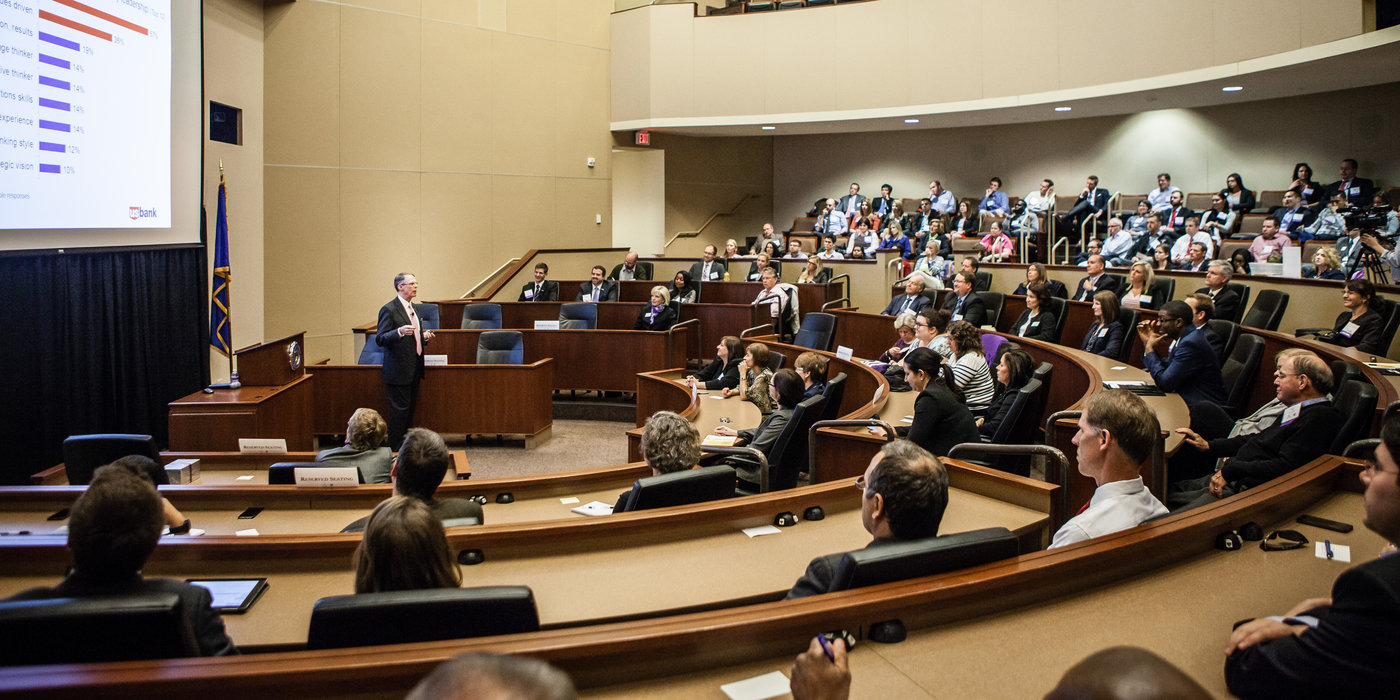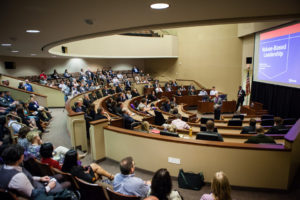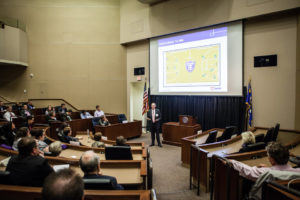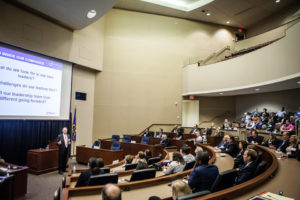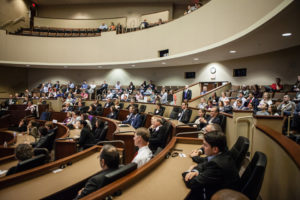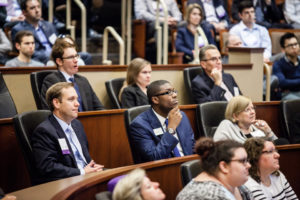Chairman, president and CEO of U.S. Bancorp Richard Davis advocates for values-based leadership.
In recent years, banking hasn’t been an industry hailed for its values-based leadership. But Richard Davis, chairman, president and CEO of U.S. Bancorp, is working to change this. He shared his views on leadership, values and the power of having a purpose during his presentation as the 2015 Opus Distinguished Speaker on May 12, 2015, at the Opus College of Business.
Davis, who began his career as a teller at age 18 and now leads a financial services holding company with more than $403 billion in total assets, is known and admired for his prudent approach to financial management, but that reserve does not spill over into his view for our economic future or what constitutes strong leadership. His optimism isn’t just “pie in the sky,” but a consideration of history combined with a call for business leaders – aspiring or otherwise – to roll up their collective shirtsleeves and get to work instead of proclaiming a current situation to be “the new normal.” He began his talk by sharing news headlines from September 1992 stating the U.S. economy would never recover from the recession; the headlines were indistinguishable from those we read today.
Davis had much to share with those who have aspirations to lead. Here, a sampling of what he’s learned during his time at the helm.
Management vs. Leadership
One of the first tasks when it comes to talking about leadership is defining the difference between manager and leader. Davis said managers “get things done, they do it well, they check a box and they go home.” Leaders, however, inspire people and outcomes on a daily basis – they do what’s asked of them, rise to the occasion and come back the next day to do more of it with the intent to change the future. “Value-based leadership is the ability to get humans to believe in something so strongly, and to trust them so deeply, that when they have the information they need they will be inspired to do amazing things,” Davis said. “As an aspiring leader, one of the most critical and meaningful criticisms you can receive along the way is that you manage well, you’re a pretty good leader, but you don’t trust your people enough. The only way the people you lead will do remarkable things is if you trust them to do what’s right.”
The Power of Purpose
A recent U.S. Bank employee survey found that the number one contributor to employee engagement is their belief in the future of the company and, most importantly, their ability to see themselves as part of that future. “People are inherently good and they want to be part of something bigger than themselves,” Davis said. “And they want to make a difference.”
To this end, Davis and leaders at U.S. Bancorp recently introduced a “power of purpose” initiative to all U.S. Bancorp employees – over 67,000 worldwide – that helps to further define the unique aspects and culture of their company, one that is guided by purpose and defined by relationships. To do this, they started by bringing together 200 groups of employees and asking them what they thought U.S. Bank stood for. They received hundreds of words that they then grouped into 18 sets, which went to another 25 groups of employees who were asked to select five that most reflected the core values the company embraces. Davis pointed out that no other company would have the same set of values – they are unique to U.S. Bank. The resulting core values helped define a roadmap for all employees as they move along in their careers.
Diversity in the C-Suite
Davis believes that the best way to create better diversity and inclusion in any company is to not only mentor people but to sponsor, or advocate, for them. There is a big difference between the two. Mentoring is often, “I’m here if you need me,” or ‘Let me know if you need anything or you have any questions.” While mentoring remains important, it can often it can come across as, “Don’t bother me unless it’s important.” “A sponsor has the responsibility to advocate for someone,” Davis explained. “To find opportunities for that person, to talk them up, to get that person in places where she wouldn’t be otherwise and make it happen. The way women and people of color will move up in companies will be to seek sponsorship.”
The Common Good
Davis stressed the importance of civics for all business leaders. This means being involved in the overall community, not just the city itself. He takes his own civic and philanthropic commitments seriously, serving on the boards of the National American Red Cross, Minnesota Orchestra, Twin Cities YMCA, Minneapolis Art Institute, the University of San Diego, the Business Council, the University of Minnesota Foundation, Greater MSP, Minnesota Business Partnership, the Clearing House and the Financial Services Roundtable. He also talked about his involvement in The Itasca Project an employer-led civic alliance whose members work on new and better ways to address the issues of jobs, transportation and education in Minnesota.
When it comes to civic involvement, Davis said a strong leader will introduce the concept and encourage people to go out and find something they are passionate about doing in their communities. “A leader can’t tell people what to do, or require them to do it, but they can make the opportunity to go and discover what that thing is possible,” he said. “Then, hopefully, they will want to do that thing as much as possible because they are passionate about it.” (Employees at U.S. Bank get eight paid hours per year to perform community service, sixteen after five years of employment.)
Listen to People Tell Their Stories
It’s important to stay open-minded about what’s coming next and not get locked into any one story or to surround yourself with people who give you only the answers you want. This speaks to a new kind of diversity in the workplace – surrounding oneself with people with a variety of experiences and opinions who can help to translate tough issues, break them down and offer unique perspectives. At U.S. Bancorp, Davis and his team rely on a group of 20-something employees – every year they change the cohort – they refer to as the “Dynamic Dozen.” This group is charged with telling senior management what’s happening within the company. It’s a way for top leadership – all of whom are in their 50s or older – to keep in touch with what’s going on within the bank.
… And Don’t Be Afraid to Tell Yours
“Storytelling is an art,” Davis said. “If I ask you to tell me how it works to be a franchise owner for Papa Johns you can give me technical language that describes what that means but that’s not what I want. Tell me how it feels to be a franchise owner of a large pizza chain and how you can distinguish yourself from the competition and be the best of all the Papa Johns – tell me that story. Storytelling is what we’re looking for in communicators, not message readers or speech givers.”
Davis referenced an annual survey conducted by The Business Counsel, a group of 150 CEOs from the 150 largest public companies in America, of which he is a member. The survey asks members what they look for in C-level executives. This year, the number one answer was “style,” which speaks to execution: How does someone step up and how do they get things done? The second quality was “values-driven.” “So the next time you have an interview with a top-level person, whether they ask you or not, find a way to weave in what’s important to you in life, what you value. They will find it refreshing and impressive because they do care about the values that bring you into the room.”
